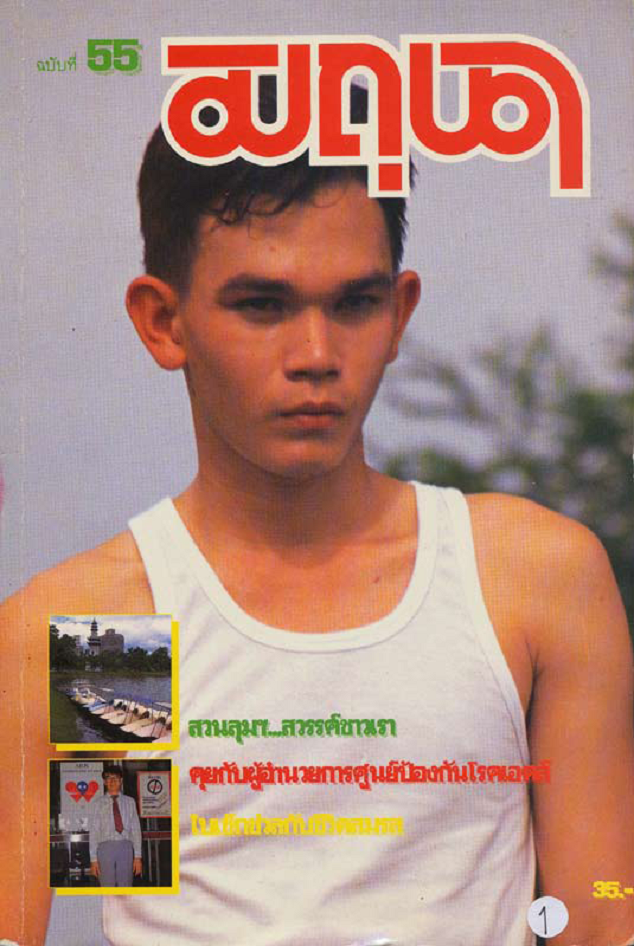A Homoerotic History of Bangkok’s Gay Middle Class Thai Gay Bars and Magazines in the 1980s and 1990s
Main Article Content
Abstract
Thailand is well known internationally for the size and vibrancy of its diverse and highly visible gay, lesbian and trans (kathoey) communities. In comparative studies of the histories of modern gay communities in Asian metropolises, such as Tokyo, Taipei and Bangkok, there has been considerable debate about whether local factors have been the driving forces in the rise of new same-sex cultures or whether Asian societies have borrowed or imported these novel cultural forms from the West. In this article, we argue that in the later decades of the 20th century, Bangkok’s gay bars and magazines were significant local influences in the development of modern patterns of homoeroticism and gay culture in Thailand. We use Thailand’s first commercially successful gay magazine, Mithuna Junior, as a source of historical information to understand the emergence of social and commercial connections between gay bars and urban middle-class gay men in Bangkok during the 1980s and 1990s. As Thailand’s market economy grew rapidly from the 1980s, the size of the middle class and the urban area of Bangkok both expanded significantly. During this period, gay bars and commercial Thai-language gay magazines created both real and virtual social spaces for middle-class homosexual men to explore their sexual and romantic lives and to develop an enhanced sense of sexual identity based on same-sex preference. In this highly dynamic situation, the editors and publishers of Mithuna Junior magazine collaborated with gay bars to produce new forms of homoerotic consumption and socialisation in which gay patron-client relationships based on class stratification developed as a dominant pattern in modernised capitalist Thailand. The distinctiveness of Thailand’s modern class-structured gay culture reflects the fact that it has emerged from the local conditions of Thai capitalism and domestic Thai-language print media.
Article Details
References
______. 1996b. “Rupture or Continuity? The Internationalization of Gay Identities,” Social Text, No. 48: 77-94;
______. 1997. “GlobalGaze/Global Gays,” GLQ: A Journal of Gay and Lesbian Studies, 3: 417-36.
Anderson, Benedict. 1983. Imagined communities: Reflections on the origin and spread of nationalism. London: Verso Books.
Berry, Chris. 1998. “Chris Berry Responds to Dennis Altman”, Australian Humanities Review, online edition. http://australianhumanitiesreview.org/2008/05/01/chris-berry-responds-to-dennis-altman/ (accessed 14 August 2021).
Carter, David. 2011. Stonewall: The Riots That Sparked the Gay Revolution. New York: Griffin.
Chauncey, George. 1994. Gay New York: Gender, Urban Culture, and the Making of the Gay Male World, 1890-1940. New York: Basic Books.
Cook, Matt. 2003. London and the Culture of Homosexuality, 1885-1914. Cambridge/New York: Cambridge University Press.
Deininger, Klaus, and Lyn Squire.(199). “Economic growth and income inequality: Reexamining the links”, Finance and Development, 34(1): 38-41.
Funatsu, Tsuruyoa and Kazuhiro Kagoya. 2003. “The middle class in Thailand: The rise of the urban intellectual elite and their social consciousness”, The Developing Economies, XLI-2: 243–263.
Ikemoto, Yukio and Mine Uehara. 2000. “Income inequality and Kuznets’ hypothesis in Thailand”, Asian Economic Journal, 14(4): 421-443.
Jackson, Peter A. 1989. Male Homosexuality in Thailand: An Interpretation of Contemporary Thai Sources. New York: Global Academic Publishers.
______. 1995. Dear Uncle Go: Male Homosexuality in Thailand. Bangkok: Bua Luang Books.
______. 1999. “An American Death in Bangkok: The Murder of Darrell Berrigan and the Hybrid Origins of Gay Identity in 1960’s Thailand”, GLQ: A Journal of Gay and Lesbian Studies, 5(3): 361-411.
______. 2000. “An Explosion of Thai Identities: Global Queering and Reimagining Queer Theory”, Culture, Health and Sexuality, 2 (4): 405-424.
______. 2009. “Capitalism and Global Queering: National Markets, Parallels among Sexual Cultures, and Multiple Queer Modernities”, GLQ: A Journal of Lesbian and Gay Studies, 15(3), 357–395.
______. 2016. First Queer Voices from Thailand. Hong Kong: Hong Kong University Press.
Martin, Fran. 1998. “Fran Martin Responds to Dennis Altman”, Australian Humanities Review, online edition. http://australianhumanitiesreview.org/2008/05/01/fran-martin-responds-to-dennis-altman/?utm_source=rss&utm_medium=rss&utm_campaign=fran-martin-responds-to-dennis-altman (accessed 14 August 2021).
Medhi Krongkaew. 1993. “Income distribution and poverty”, in Peter G. Warr (ed.), The Thai Economy in Transition, pp. 401-437, Cambridge: Cambridge University Press.
Narupon Duangwises. 2010. Gay Movement in Thai Society: Practices and Paradigms. PhD Dissertation, Thammasat University, Bangkok [In Thai].
______. 2010. “Mithuna magazine: Founding of Thai gay middle-class normativity”, Rattasatsarn, 13(3): 89-132 [In Thai].
Narupon Duangwises and Peter A. Jackson (eds). 2013. Phet Lak Chet-si: Phahuwattanatham Thang-phet Nai Sangkhom Thai - Cultural Pluralism and Sex/Gender Diversity in Thailand, Bangkok: Princess Sirindhorn Anthropology Centre [In Thai].
Narupon Duangwises and Peter A. Jackson 2017. Review of Studies of Gender and Sexual Diversity in Thailand in Thai and International Academic Publications, Paper prepared for the Thailand Research Institute, Bangkok, and presented at the 13th International Thai Studies Conference, Chiang Mai, 15-18 July 2017.
Nikom Chantarawitoon. 2007. “Labour and state: Three decades of development”, in Pokpong Chanwit (ed.), 20 Years: Puey Ungphakorn Keynote Speech, pp. 22-97, Bangkok: Open Books [In Thai].
Pimpawun Boonmongkon and Peter A. Jackson (eds). 2012. Thai Sex Talk: The Language of Sex and Sexuality in Thailand, Chiang Mai: Mekong Press.
Pranee Tinnakorn and Chalongphob Sussangkarn. 1998. Total factor productivity growth in Thailand: 1980-1995. Bangkok: Thailand Research Development Institute.


